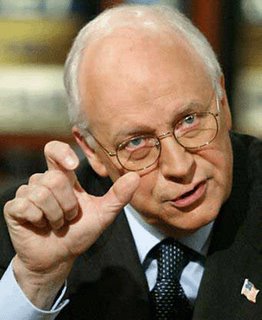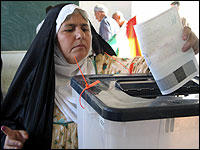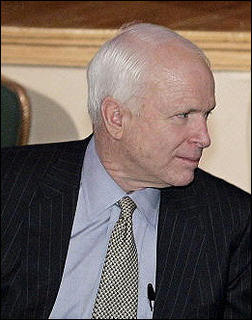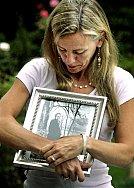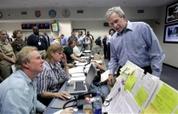
Ever since Jon Stewart took over as host of The Daily Show in '99, I have been a faithful fan. Especially at times when everything is going to Hell in a handbasket. Now it seems that the Brits are taking notice of him too. Read on and enjoy. ~Charee
Such a tease
Jon Stewart is very funny and on his cult US television show he's a rare scourge of the rich and powerful, especially Bush and his court. Gary Younge puts it to him, is he really angry with America, or is he a man on a mission for the next joke?
Saturday October 1, 2005 The Guardian
Back in early 2003, as Democrats discussed setting up a liberal talk radio station to counter the right's supremacy in the culture wars, there was concern that progressive values were inherently unsuited to a popular format. "Progressives have this problem: they sound too erudite, it's like eggheads talking at you," Thomas Athans, co-founder of Democracy Radio, Inc, told the New York Times. "Most liberal talkshows are so, you know, milquetoast, who would want to listen to them?" said Harry Thomason, a Hollywood producer close to Bill Clinton. "Conservatives are all fire and brimstone."
Meanwhile, over on the cable TV channel Comedy Central, Jon Stewart appears to have cracked it, albeit in another medium. His nightly formula of spoof news, sarcastic asides, satirical swipes and teasing interviews on The Daily Show has since 1999 been hammering away at political elites in general and, since his election, the Bush administration in particular. In that time it has gained cult status and audience figures climbing to around 1.5 million. Last month The Daily Show - a British equivalent would be somewhere between Have I Got News For You and The Fast Show - won Emmy Awards for best comedy and best writing. Stewart's book, America, a jokey guide to democracy, was the year's nonfiction bestseller. (Sample discussion question: "Which of the following is the best combination of reasons to vote for a candidate? a) Issues and eyes; b) Party affiliation and hair; c) Background and teeth; d) Religious zealotry and tits." Sample classroom activity: "Hold a mock election. If you can't do this, mock a real election.") Less blunt than Michael Moore, but more politically engaged than late-night hosts Jay Leno or David Letterman, Stewart, 42, combines the irreverence of Chris Evans with the wit of Armando Iannucci. His show is anything but milquetoast.
While Stewart and his team will often lampoon Democrats and liberals, the show's staple diet is the gaffes, contradictions, hypocrisy and hubris of the Bushites, and the pomposity of the mainstream media. He makes no secret of his liberal leanings, but his duty as a comedian, he insists, is first and foremost to be funny. "People's sense of humour typically goes as far as their ideology," he says, "but I don't particularly think of ourselves as ideological here. I don't mean in the sense that we're equal opportunity offenders - we're not. I think we consider those with power and influence targets and those without it, not. But we're not a liberal organisation, we are still clearly selfish observers. We do not have a dog in the race. And that is to our discredit, but to do what we're doing, it's also natural and necessary."
Stewart did not come from a particularly politicised family. "When I was younger, I considered myself more of a socialist. But I came from a very suburban family of middle-class Jews who joined the great migration from the city to the suburbs during the early 60s. There's nothing in there that's particularly activist. We didn't sit around the table and debate, we much more followed the I'm OK, You're OK paradigm." His mother was a teacher, his father a physicist. Born Jonathan Stewart Leibowitz, he started using his middle name as his surname in 1987. "I'm not a self-hating Jew," he once said. "Actually, to borrow a line from Lenny Bruce, I just thought Leibowitz was too Hollywood." He started his career doing stand-up (his first big gig was as the opening act for Sheena Easton in Las Vegas) and still goes on the road from time to time. But the tone of The Daily Show is less a gagfest than a repertoire of shrugs, smirks, rolling eyes, raised eyebrows and damning asides, expressing frustration and despair at the powers that be. Relating Bush's decision to have a day of prayer following Hurricane Katrina, Stewart frowned. "OK," he said, followed by a long pause and plenty of laughs, "but - and I don't want to be crass here - isn't a hurricane an act of God? Shouldn't we have a day of shunning?"
When Condoleezza Rice admitted to the Senate that she had seen a presidential daily briefing in August 2001 ... "I believe the title was 'Bin Laden Determined To Attack Inside The United States' "... Stewart just stared at the camera for 20 seconds. Then he covered his face in his hands, lifted his head up and moaned. "You're fucking kidding me, right? Please say, please say, you're fucking kidding me."
Stewart began on The Daily Show just before the 2000 election. The debacle of the Florida recount and the supreme court intervention provided ideal material. The country was shifting. With the brief respite of national unity following the September 11 terrorist attack, political discourse plunged to its most rancorous for more than a generation. Into this culture war came Stewart - a nightly reminder, principally for the urban and urbane American liberal, that their leaders, not they, were insane. In an era in which, having lost the presidential election and both houses of Congress, liberals have little to laugh about, he offers release. Asked to compare his work with Michael Moore's, Stewart says: "He's an activist. We travel in the same sorts of manipulations to some extent, but we are more passive editorialists. He's an active editorialist. I would go so far as to say that I don't necessarily agree with a lot of the stuff that he says. But I admire the fact that he puts himself out there and tries to change things."
Despite bleeped-out expletives and single entendres about blow jobs and soft drugs ("Dude, I totally want to smoke a bong with you," Stewart told a Christian fundamentalist who had been explaining the theory of intelligent design), Stewart secures high-level interviews. Over the past few years his guests have included former Democratic presidential hopeful John Kerry, Bill Clinton, former Republican presidential challenger Bob Dole, counter-terrorism chief Richard Clarke and Bush adviser Karen Hughes - vice-presidential hopeful John Edwards announced his candidacy on the show. Stewart has become a player, appearing on the covers of Newsweek, Rolling Stone and, most recently, Wired.
It's just gone three o'clock and on the street outside The Daily Show's offices on the west side of Manhattan, the day's audience has started a two-hour queue to see the show. They are young, mostly white and an even mix of men and women. One man wears a T-shirt stating: "I bet God's cock is huge."
"It's a short cut to the real news," says another audience member, Shaun Field, 27, explaining why he likes Stewart. This is Stewart's base. Two-thirds of The Daily Show's audience is aged 18-49. Fox News host Bill O'Reilly has described them as stoned "slackers", but on election night the show attracted almost as many viewers in the 18-34 category as Fox. Stewart knows his fans are out there, but... "One of the things we try not to do is to fall in love with the audience." He understands, to an extent, why he is popular - "If you feel like your philosophy is not being served by either the government or the media, then you will find comfort in a point of view that sounds or feels familiar" - but to pander to it would be counterproductive, he says. The criteria are: "Is that funny? Is that smart? Is that good? Not will those people be mad at us, will they like it." In short, Stewart is self-conscious about being unselfconscious. "The only skill I have is writing jokes," he says. "Like anything if you have an ability, ultimately you want to apply it to something you care about. Otherwise, you're just jerking off in your cage ... which also has its advantages."
The show is produced by a team whose influences are The Simpsons, Late Night With David Letterman and The Onion (a spoof magazine that blends the best of Viz and Private Eye), which is where both Ben Karlin and head writer David Javerbaum worked. The show begins with Stewart summing up the top story of the day. Then comes a spoof news segment in which a "reporter" stands against a fake, newsworthy landscape - a rubble-strewn street in Iraq, say - and pretends to be sending in a dispatch, usually as much a joke on journalists as it is on politicians. Occasionally, they really do take to the road, carrying out Ali G-style interviews in which the reporter asks outrageous questions of people so bound up in their own agendas they are apparently unaware they are the object of ridicule.
From the vantage point of New York, it can look as if the "reporters" have gone in search of a backward foreign country to patronise and have pitched up in Middle America. "You could run a Daily Show from Dayton, Tennessee," says Stewart. "People from Dayton could come to New York and cover the gay pride parade and they'd also be covering a foreign country. So much of what we do is deconstructionist and reductionist." Off-screen he sounds more like a funny academic than a brainy comedian.
After the "reports" there are more skits on regular themes such as "MessO'Potamia", the slugline for anything to do with Iraq, or "Evolution, schmevolution", a recent week-long series on the debate over creationism. Finally, Stewart has an interview with an author, politician, journalist or actor. Regardless of whether it's a rightwing ideologue just days after the election or Kurt Vonnegut offering a stream of consciousness, Stewart's tone is the same - polite and mildly mocking rather than abrasive. He says he's not comfortable being more than two minutes away from a joke.
That was the image most people had of him until October 15 last year, just a couple of weeks before the election, when Stewart appeared on CNN's Crossfire. This is a show that pits a Democrat commentator (Paul Begala) against a Republican (Tucker Carlson); they raise topical issues in rapid succession and bellow over each other in an attempt to score cheap points and earn applause from the studio audience. Stewart was clearly invited on for some light relief, but instead started to berate the two hosts for their "partisan hackery", substituting bluster for political discourse.
"Wait. I thought you were going to be funny," said Carlson. "Come on. Be funny."
"No. No," said Stewart. "I'm not going to be your monkey."
Carlson went on to chide Stewart for putting lame questions to Kerry when he appeared on The Daily Show, insisting Crossfire would have given the Democrat a grilling.
Stewart responded: "If you want to compare your show to a comedy show, you're more than welcome to ... You're on CNN. The show that leads into me is puppets making crank phone calls."
Carlson concluded: "I do think you're more fun on your show."
Stewart shot back: "You know what's interesting, though? You're as big a dick on your show as you are on any show."
In a highly scripted election, during which mainstream news rarely departed from the storyline set by the two main parties, the clash between Stewart and Carlson was electric. Supposedly the election was a battle royal between Republicans and Democrats, and Crossfire was a symbol of it. Stewart's intervention - and the wide support he received - suggested there was an even deeper divide between political posturers and the public at large. A few months later, CNN decided to take Crossfire off the air.
"Ultimately, people would respond a lot better to being treated like adults ... if politics wasn't treated like marketing," Stewart says. This sounds like a great American fantasy. Every few years Hollywood produces a film, whether it is Warren Beatty's Bulworth or Chris Rock's Head Of State, in which a presidential candidate goes off-message, tells it like it is, and the voters respond warmly. The last time we saw anyone try this was Howard Dean and he was dismissed for his lack of polish. "But who said that?" asks Stewart. "The polishers. So much of what these guys do is an attempt to consolidate power because they feel it slipping away. They think Dean's out there. But George Galloway came here and completely blew away our congressmen. We're just not used to unvarnished rhetoric." If the parties and the media serve the country so badly, why do Americans put up with it? "Because for the majority of Americans life is pretty tolerable," says Stewart. "It's very hard to organise reasonable people with moderate views. Reasonable people with moderate views don't usually light their torches and head out to town with pitchforks shouting, Be reasonable. Shit has to get really bad before people stand up and take notice."
And Stewart clearly regards himself as one of those reasonable moderates. Indeed, for a man hailed as a liberal standard-bearer, he can sound rather complacent. "In general, the more egregious flaws of our country have, over time, become less egregious," he says. "That's not to say that we don't have enormous problems of poverty and race, but they are no longer so clearcut as during the times of slavery, segregation or when women couldn't vote. In our big ticket items we're down to gay people getting married. That's a lot of progress over the past few hundred years, considering where we came from." Two close elections may have given the impression of a divided America - a nation riven between blue and red states, the secular and religious, town and country - but Stewart believes the divisions have been exaggerated. "For the amount of ultimate difference in the country, it is remarkably stable. Only one civil war in 200 years? Boy, that's something to be proud of."
The big picture from outside America looks somewhat different, and Stewart recognises that. "The thing that probably upsets the world more than anything is the sense of American exceptionalism," he says. "But it is important to keep perspective. Whatever response to 9/11 that was ham-handed or arrogant or larger than may have been required by our government, it was in many respects, regarding our history, pretty restrained. In the second world war, we interned our Japanese citizens on the west coast. Right after the revolution they had the alien and sedition acts. We dropped an atomic bomb on a country. As much talk as there is about over-reaction in our history, this has been a mild form of that. Iraq probably being an exception."
The thing that surprises him about the election last year is not that the Democrats lost, but that they came so close to winning. "Americans are loth to abandon the captain in a time of war. It's almost remarkable that Bush had to fight so hard to get re-elected, given the fact that the worse attack on American soil happened three years earlier; 100,000 votes in Ohio and the Democrats would have won it. They absolutely could have won it. It is shocking."
Stewart voted for Kerry, although he hardly seems enamoured of the Democratic party. "I don't really know what they want. The Democratic party appears to be the party of reaction. The difference between the Democrats and the Republicans is the difference between driving towards a brick wall and trying to avoid hitting a deer. The Democrats appear to try to avoid hitting things that might dart out in front of them. Whereas the Republicans clearly have plotted a road and if there's something in their way, they're just going to blow it up. Sometimes literally."
The key dividing line in America, he says, referring to the New Orleans flood, is poverty. "I have to say poor is poor. And in this country that's where people really get screwed. If that had been in Appalachia [a poor white area of West Virginia], it would still have been a real fuck-up because they're the people that people think about last."
So, as the host of The Daily Show, does he think about those people first? "Us, no," he says without skipping a beat. "We're thinking about jokes."
